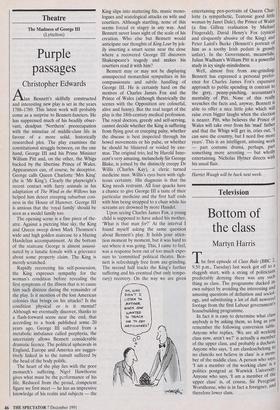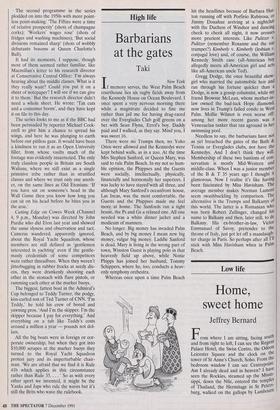Television
Bottom of
the class
Martyn Harris
The first episode of Class Rule (BBC 2, 9.50 p.m., Tuesday) last week got off to a sluggish start, with a string of politicians predictably denying there was any such thing as class. The programme ducked its own subject by avoiding the interesting and amusing questions of definition and sociol- ogy, and substituting a lot of dull newsreel footage from the first Labour government's housebuilding programme. In fact it is easy to determine what class anybody is by asking them, so long as you remember the following conversion table. Anyone who replies, 'We are all working class now, aren't we?' is actually a member of the upper class, and probably a duchess. Anyone who says, am classless/belong to no class/do not believe in class' is a mem- ber of the middle class. A person who says, `I am a member of the working class' is a politics postgrad at Warwick UniversitY. Anyone who says, 'I am a member of the upper class' is, of course, Sir Peregrine Worsthorne, who is in fact a foreigner, and therefore lower class.
The second programme in the series plodded on into the 1950s with more point- less point-making: 'The Fifties were a time of relative prosperity' (shots of champagne corks); 'Workers' wages rose' (shots of fridges and washing machines); 'But social divisions remained sharp' (shots of wobbly debutante bosoms at Queen Charlotte's Ball).
It had its moments, I suppose, though most of them seemed rather familiar, like Macmillan's letter to his research director at Conservative Central Office: 'I'm always hearing about the middle classes. What is it they really want? Could you put it on a sheet of notepaper? I will see if we can give it to them.' But the research director didn't need a whole sheet. He wrote: 'Tax cuts and a consumer boom', and they have kept it on file to this day.
The series looks to me as if the BBC had been persuaded by reporter Michael Cock- erell to give him a chance to spread his wings, and here he was plunging to earth before our pitiless gaze. It would have been a kindness to run it as an Open University filler, from whose vaults much of the footage was evidently resurrected. The only truly classless people in Britain are South Walians, where we still exist as a single primitive tribe rather than in stratified classes and where we trust only one anoth- er, on the same lines as Old Etonians: 'If you have sat on someone's head in the Wall Game then you know how long you can sit on his head before he bites you in the arse.'
Cutting Edge on Cowes Week (Channel 4, 9 p.m., Monday) was directed by John Purdie who did Eton last year and showed the same slyness and observation and tact. Cameras wandered, apparently ignored, about the Royal Yacht Squadron, whose members are still defined as 'gentlemen interested in yachting' even if the gentle- manly credentials of some competitors were rather threadbare. When they weren't jitterbugging in rubber frocks at seedy dis- cos, they were drunkenly shooting each other in the stomach with flare pistols, or ramming each other at the marker buoys.
The biggest, fattest boat in the Admiral's Cup belonged to Teddy Turner, the podgy, kiss-curled son of Ted Turner of CNN. 'I'm Teddy,' he told his crew of bored and yawning pros. 'And I'm the skipper. I'm the skipper because I pay for everything.' And everything on a tub like Teddy's costs around a million a year — pounds not dol- lars.
All the big boats were in foreign or cor- porate ownership, but when they got into $10,000 scrapes at the marker buoys they turned to the Royal Yacht Squadron protest jury and its imperturbable chair- man. 'We are afraid that we find it is Rule 41b which applies in this circumstance rather than Rule 35. . . . ' So as with every other sport we invented, it might be the Yanks and Japs who rule the waves but it's still the Brits who wave the rulebook.



























































 Previous page
Previous page